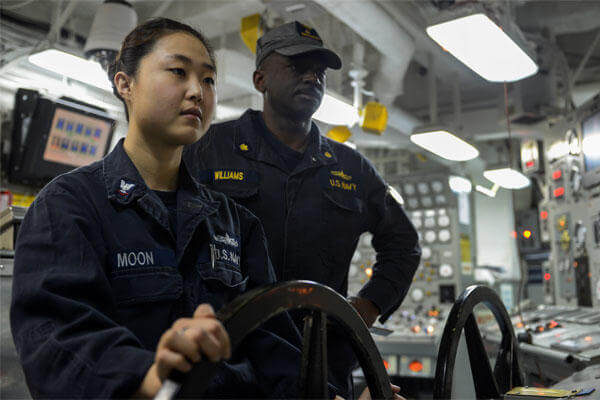NORFOLK -- U.S. Fleet Forces (USFF) and U.S. Pacific Fleet (CPF) announced the recommendations from a working group's review on the requirements and the flame-resistant qualities of fleet organizational clothing, May 29.
Adm. Bill Gortney, USFF commander, and Adm. Cecil Haney, CPF commander, ordered the working group in January after an impromptu test by the Navy Clothing and Textile Research Facility showed the Navy Working Uniform (NWU) Type I burns. "We're making some revisions to our policy that includes the introduction of new uniform items that will add an additional level of protection for every Sailor," said Gortney. "Safety is integral to every duty our men and women perform and this is something we can do to help protect them in rare cases where a fire may break out aboard a ship." The fleet will take a three-phased approach that will result in changes to the organizational clothing available to all Sailors: - In the near-term, USFF and CPF will continue to educate afloat commands on the risks and limitations of organizational clothing in use today, such as the cotton repair locker coverall. Efforts to educate Sailors on the hazards of shipboard fires and effective methods to minimize the risk of injuries will also continue. - Within the next nine months, the Navy will develop and deliver a hybrid coverall combining the designs of the existing nylon/cotton coverall currently sold in the Navy Exchange with the flame-resistant material of the current repair-locker coverall. The hybrid coverall will be available for all Sailors as organizational clothing. Current electrical coveralls will continue to be used where appropriate, and the submarine force will continue to use the low-lint coverall sold at the exchange. - In the long-term, the Navy Exchange in partnership with the Defense Logistics Agency will develop an afloat coverall that is flame resistant, provides arc flash protection and contains low lint levels necessary to satisfy submarine requirements. The estimated time for introduction of this new coverall is 36 months. Historical data reviewed by the working group showed the likelihood of a major conflagration on a ship is low, though the consequences could be severe to fatal. The working uniforms currently in use, including the NWU Type I, are deemed safe when worn properly under normal steaming conditions. The working group also determined the Naval Air Systems Command flight deck ensemble and the Naval Expeditionary Combat Command fire retardant organizational gear meet current safety standards for their respective environments. The findings and recommendations are also being made available to a second working group to determine the suitability of wearing Type I NWUs at sea. The second group, led by the USFF Fleet Personnel Development & Allocation staff, began its work this month. The organizational clothing working group included members from USFF and CPF staffs along with member of the Naval Safety Center, systems commands, type commands, and various operational commands. The Navy removed the requirement for all hands to wear flame resistant uniforms at sea in 1996 but maintained the requirement for flame-resistant clothing for Sailors who work in engineering departments, on flight decks and in other high-risk areas.



























